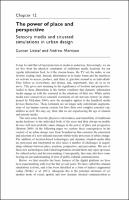Chapter 12 The power of place and perspective
Proposal review
Sensory media and situated simulations in urban design
| dc.contributor.author | Liestøl, Gunnar | |
| dc.contributor.author | Morrison, Andrew | |
| dc.date.accessioned | 2021-02-02T15:01:29Z | |
| dc.date.available | 2021-02-02T15:01:29Z | |
| dc.date.issued | 2014 | |
| dc.identifier | ONIX_20210202_9781317677758_chpt_5 | |
| dc.identifier.uri | https://library.oapen.org/handle/20.500.12657/46453 | |
| dc.description.abstract | Mobilities has become an important framework to understand and analyze contemporary social, spatial, economic and political practices. Especially as mobile media become seamlessly integrated into transportation networks, navigating urban spaces, and connecting with social networks while on the move, researchers need new approaches and methods to bring together mobilities with mobile communication and locative media. Mobile communication scholars have focused on cell phones, often ignoring broader connections to urban spaces, geography, and locational media. As a result, they emphasized virtual mobility and personalized communication as a way of disconnecting from place, location and publics. The growing pervasiveness of location-aware technology urges us to rethink the intersection among location, mobile technologies and mobility. Few studies have addressed the many transformations taking place in mobile sociality and in urban spatial processes through the appropriation of these technologies. Chapter 12 of this book is freely available as a downloadable Open Access PDF under a Creative Commons Attribution-Non Commercial-No Derivatives 3.0 license. https://s3-us-west-2.amazonaws.com/tandfbis/rt-files/docs/Open+Access+Chapters/9781138778139_oachapter12.pdf | |
| dc.language | English | |
| dc.relation.ispartofseries | Changing Mobilities | |
| dc.subject.classification | thema EDItEUR::J Society and Social Sciences::JB Society and culture: general | en_US |
| dc.subject.classification | thema EDItEUR::J Society and Social Sciences::JH Sociology and anthropology::JHB Sociology | en_US |
| dc.subject.other | Society and culture: general | |
| dc.subject.other | Sociology | |
| dc.title | Chapter 12 The power of place and perspective | |
| dc.title.alternative | Sensory media and situated simulations in urban design | |
| dc.type | chapter | |
| oapen.relation.isPublishedBy | 7b3c7b10-5b1e-40b3-860e-c6dd5197f0bb | |
| oapen.relation.isPartOfBook | 80ca0494-2e7b-4666-97a9-7ae9d7718825 | |
| oapen.relation.isPartOfBook | 80ca0494-2e7b-4666-97a9-7ae9d7718825 | |
| oapen.imprint | Routledge | |
| oapen.pages | 31 | |
| peerreview.anonymity | Single-anonymised | |
| peerreview.id | bc80075c-96cc-4740-a9f3-a234bc2598f1 | |
| peerreview.open.review | No | |
| peerreview.publish.responsibility | Publisher | |
| peerreview.review.stage | Pre-publication | |
| peerreview.review.type | Proposal | |
| peerreview.reviewer.type | Internal editor | |
| peerreview.reviewer.type | External peer reviewer | |
| peerreview.title | Proposal review | |
| oapen.review.comments | Taylor & Francis open access titles are reviewed as a minimum at proposal stage by at least two external peer reviewers and an internal editor (additional reviews may be sought and additional content reviewed as required). |

